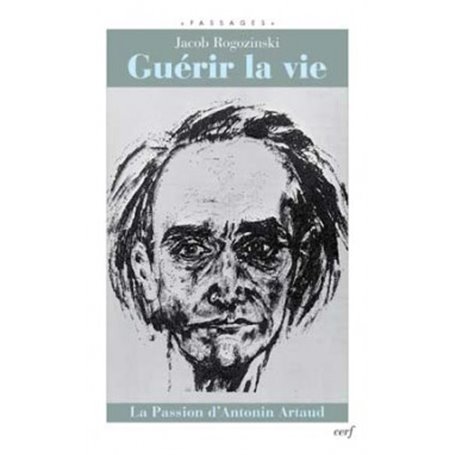GUERIR LA VIE
Format BrochéAuteur : ROGOZINSKI JACOB
33,35 €
TTC
Livraison sous 15 jours
Notes et avis clients
personne n'a encore posté d'avis
sur cet article

Livraison en Guyane tout compris

Retours et SAV simplifiés

Garantie Isleden
Description
Pourquoi écrire un livre sur Antonin Artaud ? Parce qu'il me l'a demandé : impossible de le lire sans être appelé par sa voix. Mais comment répondre à son appel sans le trahir ? Comment lire en philosophe celui qui clamait sa « haine de la philosophie » ? Comment le lire sans le dévorer ni se laisser dévorer par lui ? Règle de lecture : ce qu'il écrit est vrai. Laissons cette vérité s'affirmer par elle-même sans lui imposer la grille d'une pensée étrangère et sans prétendre la fixer dans la psychose ou la métaphysique. Pas de cruauté, pas d'impouvoir, pas de schizophrénie, pas de corps sans organes : autant de stéréotypes, de maîtres mots qui font obstacle à la lecture. Pourquoi écrit-il ? Pour sauver de l'oubli ses muses assassinées, ces corps massacrés, tous ces morts « dont le nom n'a jamais passé dans l'histoire ». Pour sortir de l'enfer, pour traverser cette « Poche Noire » où il a sombré, se réapproprier son je, son nom dont il a été dépossédé. Si la folie est l'absence d'oeuvre, le retour du Mômo est une « insurrection de bonne sant?, la bonne nouvelle d'une résurrection : il est possible de franchir la mort, de franchir « dieu » pour se refaire un corps. Il est possible de guérir la vie. C'est ce combat contre la folie, la mort et l'oubli, ce combat pour la vérité, que j'ai tenté ici de décrire : en passant de la scène du mythe de la révolution théâtrale qui devait figurer la vie à celle du fantasme, de la hantise sexuelle, du père-mère puis en remontant vers une dimension plus originaire, vers l'énigme d'une vie sans être, d'une chair qui est moi. Chair déchirée, en quête de son incarnation majeure, chair qui ne cesse de mourir, et pourtant toujours renaissante... Cette vérité du moi-chair qu'il voulait faire résonner dans la langue et le rythme du poème, sommes-nous enfin capables de l'entendre ?
--
Why should I write a book about Antonin Artaud? Quite simply because he asked me to, for it is impossible to read his work without hearing his call. But how could I answer his call without betraying him? How could I read, as a philosopher, a man who proclaimed his hatred of philosophy'? How could I read him without devouring him, and letting myself be devoured by him? Reading guide: what he writes is true. Let's allow this truth to affirm itself, without imposing the rules of an alien mind and without claiming to contain it within a psychosis or metaphysics. No cruelty, no powerlessness, no schizophrenia, no bodies without organs: these are so many stereotypes, keywords that form obstacles to the reader. Why does he write? To save his murdered muses, butchered bodies, all those dead whose names were not passed on by history' through forgetfulness. To find an exit from Hell, to traverse that Black Hole' he had sunk into, recover his I' and the name that had been taken from him. If madness is the absence of creation, the return of Momo' is an uprising of good health', the good news of a resurrection: it is possible to go beyond death, to go beyond God' to recover one's body. It is possible to cure life. It is this fight against madness, death and forgetfulness, this combat for truth I have tried to describe here: passing from the scene of the myth from the theatrical revolution that life was supposed to represent to that of fantasy, sexual obsession, mother/father then moving upwards to a more original dimension, towards the enigma of a life without being, flesh that is me. Torn flesh, in quest of its major incarnation, flesh that never stops dying yet is constantly reborn... This truth of me-flesh that he sought to proclaim in the language and rhythm of poetry... are we, at last, capable of hearing it?
--
Why should I write a book about Antonin Artaud? Quite simply because he asked me to, for it is impossible to read his work without hearing his call. But how could I answer his call without betraying him? How could I read, as a philosopher, a man who proclaimed his hatred of philosophy'? How could I read him without devouring him, and letting myself be devoured by him? Reading guide: what he writes is true. Let's allow this truth to affirm itself, without imposing the rules of an alien mind and without claiming to contain it within a psychosis or metaphysics. No cruelty, no powerlessness, no schizophrenia, no bodies without organs: these are so many stereotypes, keywords that form obstacles to the reader. Why does he write? To save his murdered muses, butchered bodies, all those dead whose names were not passed on by history' through forgetfulness. To find an exit from Hell, to traverse that Black Hole' he had sunk into, recover his I' and the name that had been taken from him. If madness is the absence of creation, the return of Momo' is an uprising of good health', the good news of a resurrection: it is possible to go beyond death, to go beyond God' to recover one's body. It is possible to cure life. It is this fight against madness, death and forgetfulness, this combat for truth I have tried to describe here: passing from the scene of the myth from the theatrical revolution that life was supposed to represent to that of fantasy, sexual obsession, mother/father then moving upwards to a more original dimension, towards the enigma of a life without being, flesh that is me. Torn flesh, in quest of its major incarnation, flesh that never stops dying yet is constantly reborn... This truth of me-flesh that he sought to proclaim in the language and rhythm of poetry... are we, at last, capable of hearing it?



